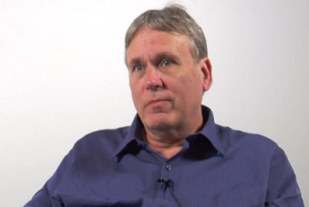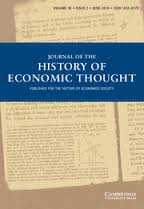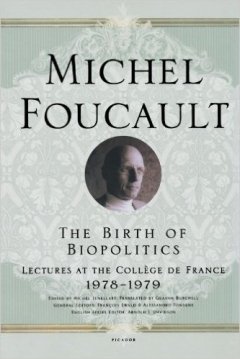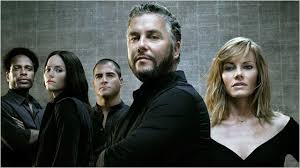 At the latest History of Economics Society Meeting, I, with a number of friends and colleagues (co-bloggers Béatrice Cherrier, Till Duppe and Floris Heukelom), participated in a roundtable devoted to “the practical challenges of writing recent history”, organized and chaired by E. Roy Weintraub. On this occasion, we all gave speeches – mostly drawn from personal experiences – that addressed how writing the history of recent economics is different from doing the history of older economics and the kind of practical issues it required us to consider. Most of our talks addressed at some point or another the relation to current economics: on the one hand, writing the history of recent economics resonates with current research in the field, but on the other hand, economists can disagree – sometimes in print – with the kind of accounts that historians construct about them. So, in sum, writing on recent economics can help you being noticed by economists, but sometimes there is attention you may just want to avoid. Then, at the end of what was an interesting, if somewhat polite, discussion, Philip Mirowski intervened, saying that our talks were, in his opinion, too focused on our relation with economists, that we have no reason to fear them, that they have no interest in history whatsoever, whereas, at the same time, science studies scholars are mostly concerned with economics as a subject, because they feel that the prevalence of economic imperatives on the academia is a threat to the humanities departments in which they are located.
At the latest History of Economics Society Meeting, I, with a number of friends and colleagues (co-bloggers Béatrice Cherrier, Till Duppe and Floris Heukelom), participated in a roundtable devoted to “the practical challenges of writing recent history”, organized and chaired by E. Roy Weintraub. On this occasion, we all gave speeches – mostly drawn from personal experiences – that addressed how writing the history of recent economics is different from doing the history of older economics and the kind of practical issues it required us to consider. Most of our talks addressed at some point or another the relation to current economics: on the one hand, writing the history of recent economics resonates with current research in the field, but on the other hand, economists can disagree – sometimes in print – with the kind of accounts that historians construct about them. So, in sum, writing on recent economics can help you being noticed by economists, but sometimes there is attention you may just want to avoid. Then, at the end of what was an interesting, if somewhat polite, discussion, Philip Mirowski intervened, saying that our talks were, in his opinion, too focused on our relation with economists, that we have no reason to fear them, that they have no interest in history whatsoever, whereas, at the same time, science studies scholars are mostly concerned with economics as a subject, because they feel that the prevalence of economic imperatives on the academia is a threat to the humanities departments in which they are located.
My feeling is that, even though Phil expressed his opinion in his own distinctively provocative way, he was right and that, on the other hand, by focusing too much on the relation between history of economics and economics, we may not be fully wrong, bu t still, at the very least, mistaken. For at least one part of the argument is true: economists, on the whole, are not interested in the history of their field and are not likely to be interested in it anytime soon. A bibliographic research I have undertaken over the past few years with my friend and fellow Pedro Duarte – forthcoming in the Journal of the History of Economic Thought -, focusing on the historical pieces published in major economics journal, led us to reach quite clear conclusions:
t still, at the very least, mistaken. For at least one part of the argument is true: economists, on the whole, are not interested in the history of their field and are not likely to be interested in it anytime soon. A bibliographic research I have undertaken over the past few years with my friend and fellow Pedro Duarte – forthcoming in the Journal of the History of Economic Thought -, focusing on the historical pieces published in major economics journal, led us to reach quite clear conclusions:
The trends we observe … seem to illustrate … [the] increasing estrangement between economists, when writing to the profession at large in their general top journals, and HET. Not only have we shown that, in contrast to the 1970s, fewer HET papers have been published recently in most of the top journals we studied, but we also demonstrated that the papers that have been published are so diverse in the methods they use and the issues they address that it is very hard to see them as a coherent whole—not to mention as part of a unified subfield. In particular, the fact that most of these articles rely not on specific tools and methodologies, but, rather, on surveys and quite general statements may have contributed to the conflation of historical investigations and literature surveys. Therefore, practicing economists themselves have become the main narrators of their past, whereas historians are less and less seen as the expert community to be properly consulted when accounts of past economics are needed. … As a result, the issues that are central to the latest developments of the history of economics … and the new tools that historians are using to address them … have yet to make their way into the mainstream literature.
 On the other hand, sociologists, historians, political scientists, and even management scholars are increasingly drawn to the history of recent economics. They do so because they feel that economics is an important part of today’s social, political and cultural environment and they want to understand it. Of course, there’s nothing new about this. Another friend and colleague of mine, Loïc Charles, has done work on 18th century economics with practicing historians, showing how economic thinking was intertwined with a lot of things happening at the time: international trade (including, most notoriously, slave trade), the colonization of the Americas, the French revolution, etc. But what is specific to the recent – postwar – period, is that economic thinking is not just mixed with other types of knowledge and practices, but increasingly, is THE knowledge which is used as a way to ground, to legitimize all knowledge and practices. This recent move toward the economization of every aspect of our society is what researchers have come to designate as “neoliberalism”, and this is the one of the main concepts that makes the study of postwar economics a possibly interdisciplinary venture, one that has a lot of chance to attract readers and create scholarship.
On the other hand, sociologists, historians, political scientists, and even management scholars are increasingly drawn to the history of recent economics. They do so because they feel that economics is an important part of today’s social, political and cultural environment and they want to understand it. Of course, there’s nothing new about this. Another friend and colleague of mine, Loïc Charles, has done work on 18th century economics with practicing historians, showing how economic thinking was intertwined with a lot of things happening at the time: international trade (including, most notoriously, slave trade), the colonization of the Americas, the French revolution, etc. But what is specific to the recent – postwar – period, is that economic thinking is not just mixed with other types of knowledge and practices, but increasingly, is THE knowledge which is used as a way to ground, to legitimize all knowledge and practices. This recent move toward the economization of every aspect of our society is what researchers have come to designate as “neoliberalism”, and this is the one of the main concepts that makes the study of postwar economics a possibly interdisciplinary venture, one that has a lot of chance to attract readers and create scholarship.
For years, I have resisted this “neoliberal” narrative. I thought that neoliberalism was a complotist construction, that it was hard to pretend that a small group of Austrian economists, even helped by some well-organized think tanks, could influence society at large so as to create a culture so ubiquitous that we are all influenced by it, whether we like it or not. But now the literature on neoliberalism has attained a critical mass, and I must say that, altogether, it provides a good analysis grid of what’s happening in the world, even though we think that there is much to criticize in all of these contributions. There’s of course, Foucault’s 1979 course at the College de France, which falls short of details, but sets up the big picture, but in recent years, many other books have helped developed the neoclassical narrative: Wendy Brown’s philosophical account of how neoliberalism is detrimental to democracy, Bernard Harcourt’s assertion that neoliberalism is transforming all citizens into punishable subjects, Sonia Amadae’s claim that the neoliberal citizen and consumer is the strategic rational actor, described in non-cooperative game theory, Elizabeth Popp Berman depiction of the economization of academic science, etc. And of course there are all of Phil Miroswki’s contributions to the subject: see here, there, and everywhere.*
 So, is it convincing? Well, let’s take for instance Béatrice’s latest post. She talks about Paul Romer being appointed as chief economist of the World Bank. First, why should we be concerned about this? Why is it so special that there is a new chief economist whereas we do not seem to have much to say about Dr. Jim Yong Kim, who is an American (Korean-born) physician, and is the actual President of this institution? Well, maybe, it is because we feel that economic knowledge is going to be more important than medical knowledge when it comes to decide how countries need to be helped financially. That is something that the neoliberal narratives tries to explain. And what was Romer doing before he got this new position? I quote Béatrice, here: “Romer left academia to engineer a teaching and grading plateform called Aplia.” Some neoliberalism scholars have argued that this kind of platforms offer instances of the neoliberal transformation of education. And what about Béatrice’s last point on how “the replacement of McNamara and Chenery by Alden
So, is it convincing? Well, let’s take for instance Béatrice’s latest post. She talks about Paul Romer being appointed as chief economist of the World Bank. First, why should we be concerned about this? Why is it so special that there is a new chief economist whereas we do not seem to have much to say about Dr. Jim Yong Kim, who is an American (Korean-born) physician, and is the actual President of this institution? Well, maybe, it is because we feel that economic knowledge is going to be more important than medical knowledge when it comes to decide how countries need to be helped financially. That is something that the neoliberal narratives tries to explain. And what was Romer doing before he got this new position? I quote Béatrice, here: “Romer left academia to engineer a teaching and grading plateform called Aplia.” Some neoliberalism scholars have argued that this kind of platforms offer instances of the neoliberal transformation of education. And what about Béatrice’s last point on how “the replacement of McNamara and Chenery by Alden
Clausen and Anne Krueger in 1982 shifted the Bank’s philosophy toward a ‘Washington Consensus‘ consistent with Reagan’s program”? That is also the subject of many contributions to the history of neoliberalism. In fact, we now have a neoliberal narrative for everything: even TV series are subjected to it.
So, should we embrace all of it? Of course, not necessarily. These accounts are often partial and in need of qualification. Also, I am not claiming that every history about modern economics is underwritten by this neoliberal narrative. There are many other narratives to draw. But this is one strong reading of the current situation, and as such it needs to be addressed. This is also a fascinating laboratory for possible discussions between historians and sociologists of all social sciences, as well as with cultural theorists and political scientists. This is why I expect that when Pedro, Joel Isaac, Verena Halsmayer and I do the next HISRECO conference in Lucerne on April, 21-22 2017 (call for papers coming soon!!), the term “neoliberal” is going to pop up once again on several occasions.
*Not to mention the fact that even notorious neoliberal institutions have ended up acknowledging themselves.

My problem is not with explaining social change in the past 50 years by neoliberalism. It is with 1) considering neoliberalism as the sole explanation for changes in knowledge, policy and economic regimes 2) considering neoliberalism as a consistent, unified and stabilized set of ideas which was developed by a small number of thinkers (Director, Hayek, Friedman, Reagan, Thatcher, or that seemingly ubiquitous Mont Pelerin Society), then disseminated without fundamental alteration, and thus 3) considering most scientists, thinkers, civil servants, businessmen and voters as puppets of these few string-pullers.
I have grown up with Phil Mirowksi’s definition of neoliberalism in mind (http://public.econ.duke.edu/~erw/190/Mirowski%20Defining%20Neoliberalism.pdf). I initially liked it, because it aptly showed how different neoliberalism was from classical liberalism. Also, the 11-points definition made it clear that neoliberalism wasn’t a straight rejection of government intervention, but a careful redefinition of its (narrow) boundaries. But there was no sense, in Phil’s narratives, about how this collective worldview travelled and was disseminated, no sense of accidentally buying into it when endorsing cost-benefit analysis in such and such government offices, no sense of blending it with otherwise interventionist ideas, no sense of being altered when embedded in various national traditions. Just the contrary, he made “neoliberalism” artificially homogenous and stable by erecting MPS as a gatekeeper, a guardian of the wisdom. And I am yet to be convinced that MPS membership was more than, at best, merely a catalyst (which I believed it was for Friedman), and more often, signaling, networking, opportunism or a windfall effect. Beth Berman’s work, I find, brings a sense that the neoliberal turn, if any, was not just an orchestrated takeover, but also the result of myriad of ambiguous and multifaceted decisions and practices (I have yet to read to read Harcourt and Brown).
What I would like to read are narratives about neoliberalismS, narratives about public intellectuals, businessmen and technocrats fighting to establish their own brand of ideology, their own political programs. I want to see neoliberalismS weighted against other personal and collective agendas (inter alia, most of those scholars you mention write about neoliberalism as a “debunking exercise,” and I believe showing the dirty secret fights among neoliberal warriors would be a better strategy than painting them as Moriarties or the Brotherhood of Evils – it seems lay audiences find more appeal in supervillains than superheroes lately)
Finally, I don’t think “economicization” is an appropriate synonym for neoliberalism. There are many ways in which society was economicized (emphasis on quantification and/or markets and/or information and/or coordination among others).
Then, if in 20 years from now, you plan to historicize Romer as a case study of the dissemination of neoliberalism, you will need to show me 1) that his development of Aplia was driven by explicitly endorsed or implicit ideas about markets, individual choice, incentives, information akin to the neoliberal creed rather than by biographical characteristics, technological change, encounters, an idyosincratic vision of growth, or else. 2) that the neoliberalism embedded in the Washington Consensus was true to Foucault, Mirowksi or whoever gets to define its tenets, and how it stuck around after new president and chief economists were nominated. 3) and that the programs Romer implemented were neoliberal in that they represented a special kind of economicization of development and urban policies. Good luck with that. Meanwhile, I’ll be looking for an “urbanicization” of development economics.
Well, I don’t think we fundamentally disagree on anything, here. That neoliberalism is not a fixed concept but something that has evolved among various communities and in different periods is something that is argued by much of the contributions I have mentioned above. Foucault himself distinguishes different streams of neoliberalism (German ordoliberalism and American anarcho-liberalism, most notably) and Wendy Brown does just that as well, explaining that in the 1990s, neoliberalism evolved along the lines of portfolio theory (and in Amadae, it’s still a different beast, and Elizabeth Popp Berman does avoid the word, but still is studying something very similar to my understanding of neoliberalism). So if you want “neoliberalism” is like “cold war science”. It is not something that “truly really” exists, it is just a meta-narrative which can be clarified (see also Fourcade and Babb 2002 http://sociology.berkeley.edu/sites/default/files/faculty/fourcade/AJS_Final.pdf). Like “cold war science”, it may be (and needs to be) disaggregated, but we also need to find some kind of balance in this disaggregation because too much of it can lead to cheap publication (“In this paper, I qualify the concept of neoliberalism by studying the case of country X, which blablabla…”). It is always easier to argue that something is not as homogeneous as we think it is than to come up with a new grid of analysis, right? As for the idea that economization of society is different from neoliberalism, well … sure … but then you’ll have to argue with Ted Porter, too! http://www.cultureunbound.ep.liu.se/v4/a32/cu12v4a32.pdf
But anyway, my main argument was that “neoliberalism” (whatever it may be) brings more people together and yields more scholarship than the kind of history that explicitly tries to address the economics profession (our new research with Pedro aims at studying the citations of history papers published in top economics journals … and well, it may end up being the most depressing research each of us has ever undertaken!). And of course, there’s hope outside neoliberalism, too: while you go on with your urban economics paper, I’ll try to finish my co-written social museums piece (and the word ‘neoliberal’ is quite unlikely to be used in there!). So good luck to both of us!